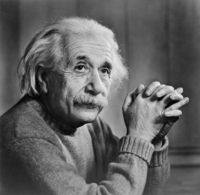The time in science
The concept that science has about the time has evolved several times throughout history. We can say that the first great theory is the one that is usually called classical physics and that Isaac Newton proposed in his book Philosophiae Naturalis Principia Mathematica. Newton thought that the time determines the relationship between the speed and the distance that an object travels. The following formula may be well known by all of us:
Speed = Distance/Time

Albert Einstein
A trip at the speed of light would travel a different distance for a traveler placed on the light beam than for one out of it in the same period. Consequently, the speed is different for each observer. Einstein claimed that the speed of light is absolute and therefore it does not depend on the observer. As a conclusion, and given that space is relative and different for every observer, time shall be likewise.
Special relativity did not seem consistent with Newton's theory of the gravitation. This problem challenged Einstein for some years, until 1915 when he reconciled both theories in his general relativity theory. In this Einstein explained that space and time are intimately bound and gravity has a direct influence on the time. One of the conclusions of this theory shows us that the parabolic movement of the planets is equivalent to a rectilinear movement in the half-framed space-time, the planets follow what is called a geodesic one.
Following this reasoning we can conclude that time goes by slower the closer to a massive object we are. It is possible to empirically verify that it exists a difference between a clock located on the surface of the earth level and one that is far from it. This effect has consequences in the GPS systems, for example, the clocks on the satellites are faster than the ones located on the surface of the earth, and the difference is the one that Einstein theory predicts.